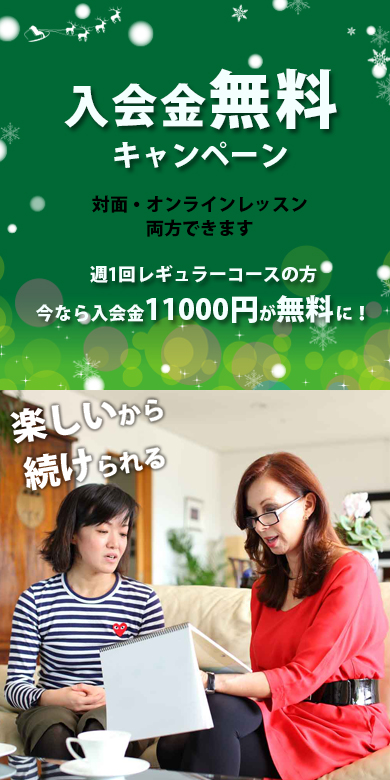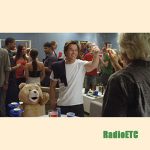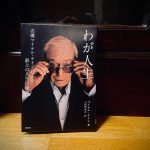商談の英語力は実践的ロールプレーで ジェンマ先生(代官山) ETCマンツーマン英会話
 (*)2012年9月ロンドンへ引越
(*)2012年9月ロンドンへ引越
Q: お生まれはどちらですか?
ロンドンの郊外にある、ハートフォードシャーのセント・オルバンズという町で生れました。古代ローマ時代の町として有名で、深い歴史を持ち、大聖堂などがあるとても綺麗なところです。私は、母がフィリピン人で父はイギリス人のハーフです。生れ育ったのはイギリス。弟がいます。18歳までその町でくらし、大学進学のためにロンドンに越しました。
I am from a town called St Albans. It’ a city in Hertfordshire, which is the outside of London. It’s basically famous for Roman time. So it’s got lots of history and big cathedral and it’s very pretty. So I was brought up a multiracial house actually. So my mother’s from Philippines and my father’s English. But obviously I was born in England. And I was brought up Britain. And I have one younger brother and stay there until about 18. And I went to the university near to London.
Q: 英語の先生になられた理由は?
私は、セールスとマーケティングに関して豊富な経験を持っています。直近ではロンドンで広告の仕事にも携っていました。これらのスキルがビジネスの世界で活躍する生徒さんの役に立つことが分かったのです。また、約一年間日本航空等でフライト・アテンダントとして働いたこともあります。 その経験からカスタマーサービスについても理解を深めることができました。おかげで、日本人の文化についてよく知ることができましたし、生徒さんに心地よく学んでもらい、自信を付けてもらうことも、私は得意だ思うのです。
So I have lots of sales and marketing experience. And I went to advertising most recently in London. And I have found and through doing teaching I can use those skills to help students and business sector responses. I also was a flight attendant for Japan Airline and other airline company for about one year, which will help with the customer service. I mean that I have good understanding of Japanese culture. And I think. am good at making people feel comfortable and confident so that I can to courage them really.
 Q: TEFL(teaching English as a foreign language)の資格も取得されたんですね。
Q: TEFL(teaching English as a foreign language)の資格も取得されたんですね。
はい、取得しました。英文法の教授法など基本的な事柄は理解できています。でも、英語を教える際に最も大切なのは、会話すること、できるだけ多くのロールプレーを行うこと、実際の場面を想定しながら、お互いの役を決めて、実際に近い形で会話することだと思います。
Yeah, I have basic understanding of grammar. And I think if you are teaching English, the most important thing is conversation, role-play as much as possible.
例えば、「ビジネスの交渉においてもっと自信を付けたい」という生徒さんがいらっしゃいました。そこで、私は生徒さんが実際に扱っている商品について調べ、その商談のためのロールプレーを創ってみました。アメリカの取引先と商談で実際に使われそうな英語の言い回しを使った、とてもリアルなものでした。セールスマーケティングに関しては豊富な経験を持っていますので、たくさんの異なった種類のロールプレーにも私は対応可能です。
I have had an example, one student said “within business situation I want to be more confident in negotiating”, so I created the role-play and learned about the custom products and we had a role and sales conversation. And I would give them natural English so that when they are meeting with American client. they would be able to say real, real English, real conversation that others would understand. So I can do lots of different role-play to suite the situations.
Q: ところで、映画『それでも恋するバルセロナ』に出演したのイギリス人女優、レベッカ・ホールは映画ではアメリカ人のアクセントで英語を話していました。イギリス人の方が、アメリカ人のアクセントで話すのは、簡単なことなのですか?
 そう思います。ハリウッドなどでは多くのイギリス人女優がアメリカ人アクセントで話しているので、イギリス人だと気付かれないこともあります。映画『タイタニック』の女優ケイト・ウィンスレットはご存知ですよね。彼女はイギリス人なのですが、通常はアメリカ人のアクセントで話しています。でも、アメリカ人が他の国のアクセントで話すということは、通常ではあまりないですね。
そう思います。ハリウッドなどでは多くのイギリス人女優がアメリカ人アクセントで話しているので、イギリス人だと気付かれないこともあります。映画『タイタニック』の女優ケイト・ウィンスレットはご存知ですよね。彼女はイギリス人なのですが、通常はアメリカ人のアクセントで話しています。でも、アメリカ人が他の国のアクセントで話すということは、通常ではあまりないですね。
I think so. There’re many actresses do that, because a lot of English actresses like in Hollywood, and then you wouldn’t realize that there actually English, because they are speaking American. Have you seen Titanic? You know Kate Winslet? She’s English, but she’s always speaking American. It’s more unusual for Americans to change to the different accent.
Q: 日本人がイギリス人に共通点を感じるとしたらどんなところでしょうか?
こんな例があります。あるビジネス英語のテキストを使って授業を行っていたときの話しです。日本人の方はとてもつつましやかですから、自分の上司がこんなふうな話し方をするのを聴くことは、まずないと思うのです。「でかしたぞ。最高の仕事をしたね。君は一番だよ!
(Oh, well done! You did a great job! You are the best!)」 And, for example, I was teaching this student from a book. It’s all about in a business situation. In Japan you are more humble, it would be rare for you to hear your boss to say, “Oh, well done! You did a great job! You are the best!”
 私が「実際イギリス人はこんな言い方はしないと思いますよ」と言うと、生徒さんも、「日本人もしません」とおっしゃっていました。これはアメリカ人の教科書ですからね。私だったら「よくやったわね。あなたの努力のおかげですよ。(well done. Thanks for your hard work.)」ぐらいの言い方になると思いますが、この教科書のような言い方は決してしないですね。(イギリス人にとっては)不自然な表現になってしまいます。おそらく、ビジネスの面において、イギリスと日本はより類似点が多いと思うのです。文化的に近しいことがらが多いですよね。
私が「実際イギリス人はこんな言い方はしないと思いますよ」と言うと、生徒さんも、「日本人もしません」とおっしゃっていました。これはアメリカ人の教科書ですからね。私だったら「よくやったわね。あなたの努力のおかげですよ。(well done. Thanks for your hard work.)」ぐらいの言い方になると思いますが、この教科書のような言い方は決してしないですね。(イギリス人にとっては)不自然な表現になってしまいます。おそらく、ビジネスの面において、イギリスと日本はより類似点が多いと思うのです。文化的に近しいことがらが多いですよね。
So I was teaching this text to a businessman, and I said to him “actually I wouldn’t do that in England”. He said “we wouldn’t do it Japan”, because this is the American textbook. I would just say, “well done. Thanks for your hard work.” But in this book, it was “Great job. You are the best!” I never ever speak like that. I just can imagine Japanese person do neither. That’s not natural. So I think at business point of view, maybe there are more similarities between English and Japanese.Do you see what I mean? Cultural similarity.
☆ジェンマ先生出演のRadioETC


















